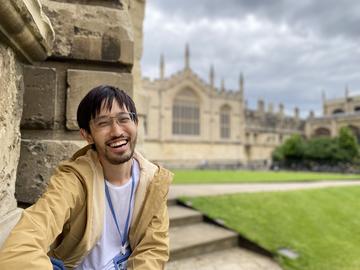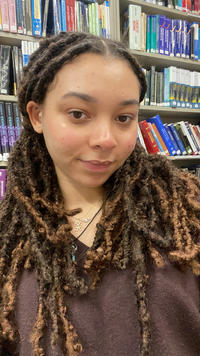Sanskritist Yizhou/Yijo Liu (刘毅舟)

Yizhou Yijo Liu

Interviewed and written by Akira Gayle-O'Rourke, who was in her third year reading B.A. in Chinese Studies
First Impressions of Oxford
For Yijo, coming to Oxford wasn’t about chasing prestige—it was about studying Sanskrit in the best possible environment, surrounded by experts who shared his enthusiasm. “Sanskrit is a small world, and I believed Oxford was the best place to study it”, this was because of the sheer amount of experience and passion each professor had.
Rather than feeling intimidated, he was excited to immerse himself in the subject. Most of his classmates were also completely new to Sanskrit, which ensured he was not alone in his transition into the language. “Whatever I struggled with, there was always someone—whether a professor, a classmate, or even my college friends from different subjects—to help me through.”
Oxford has struck as an incredibly international place from the very beginning, and Yijo has found it easy to fit in. As he put it, “being a Chinese student studying the history of India in the U.K., I often find myself in an exceptionally fortunate position, engaging with both the local Indian and Chinese communities, drawing insights from diverse backgrounds”.
Learning Sanskrit at Oxford
One of the best things about studying Sanskrit at Oxford was the small class size. For elementary Sanskrit, Yijo was in a group of just six students, including postgraduates, which led to deeper connection with both the subject and his classmates. The mix of different ages and backgrounds in the group created a dynamic learning environment, where everyone could bring unique perspectives to discussions.
He noted that the way Sanskrit was taught at Oxford was a big shift from high school.
Instead of following a rigid structure, he was encouraged to develop their own understanding of the language. “Professors provided a framework, but it was up to the students to truly internalize the language” —a process that many linguists believe is key to mastering a new language.
“The academic support was incredible,” Yijo says. “Every professor had their own unique teaching style, but they were all brilliant.” Some professors who particularly stood out to him include Victor D’Avella, John Lowe and Sasha Restifo. They made Yijo realise that most professors were once language students themselves, which made them truly understand the challenges of learning a new language—especially the less commonly taught ones like Sanskrit and Prakrit.
Challenges and Lessons Learned
Sanskrit, like any language degree, comes with its difficulties. For Yijo, memorization was his biggest obstacle. Sanskrit is a well inflected language with evolving grammatical structures. As the language of the knowledge society in ancient India, it also has a vast body of literature spanning thousands of years. As such, Sanskrit required him to navigate classical texts of different genres and styles, which can feel like learning multiple languages at once.
“Languages take up a lot of brain space,” he laughs. “At one point, I had to remind myself to stop, breathe, and just take it one step at a time.”
His biggest takeaway? Don’t stress too much. The work is tough, no doubt, but he learned not to let it overwhelm him. He also loved the flexibility of his course, which let him explore what interested him most. He ended up diving into Indo-linguistics and even got the chance to study Prakrit and Persian alongside Sanskrit.
Oxford’s tutorial system, he says, taught him something beyond just academics. “You learn to challenge people while being challenged yourself,” he explains. “That’s a skill that sticks with you long after you leave university.”
Sanskrit Beyond the Classroom
One of the highlights of Yijo’s time at Oxford was producing two Sanskrit plays, with over 100 people in the audience. “It was such a fun way to bring Sanskrit to life,” he says. The best part was that the Students had full creative control. It wasn’t just about academics—it was about making the language accessible to people who might never have encountered it before. Yijo further commented, “I thought it would be ‘playful’ to really bring Sanskrit playscript from page to stage. And the support from the University, the AMES Faculty, the colleges and the Sanskrit student community was incredible. Oxford is, really, what you make it.”
You can read more about the plays that Yijo led at https://www.ames.ox.ac.uk/oxford-sanskrit-play.
Life After Sanskrit
For Yijo, studying Sanskrit wasn’t just about preparing for a specific career—it was about developing skills and passions that could take him anywhere. And that’s exactly what happened.
Today, Yijo works as a high school counselor in China, helping students discover their own passions and guiding them toward meaningful careers—just as he found his own path through Sanskrit. He also teaches an extracurricular Sanskrit class for those who are interested both online and in person. The class is open to all, and it attracts a fascinating mix of students—sometimes even monks and Buddhists join.
While Sanskrit-related jobs may be rare, Yijo sees it differently. “The beauty of studying something like Sanskrit is that it gives you so many transferable skills—critical thinking, communication, research—it’s really about how you apply them.” His journey shows that sometimes, following your passion can lead to places you never expected, and that’s what makes it all worthwhile.
Advice for Future Students
If you’re thinking about studying Sanskrit at Oxford, Yijo has a few words of wisdom:
- Don’t let your degree define you. University is about more than just your subject—take the time to explore your interests.
- Passion matters more than prior knowledge. “The faculty cares more about your enthusiasm for Sanskrit than whether you already know it,” he says.
- Take it slow. Learning a language isn’t about rushing—it’s about consistency. “Do a little every day, and don’t panic when it gets tough.”
- Reach out for help. Don’t ever hesitate to talk about your struggles with your senior tutor at the College or subject coordinator at the Faculty. They are there to support your success.



